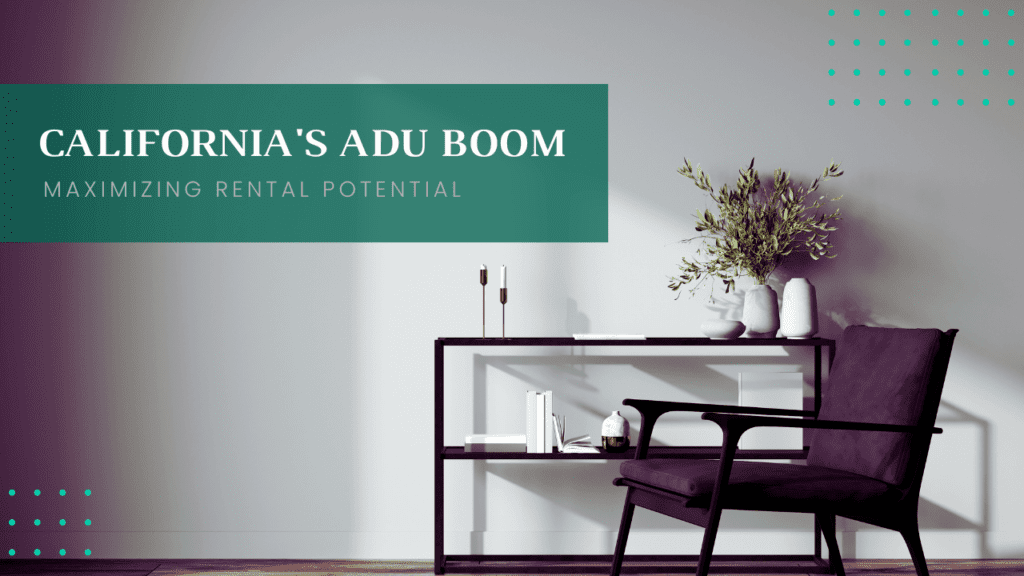
In common language, you’ll often hear people refer to ADUs as granny flats, in-law suites, garage apartments, or backyard cottages. Regardless of the name or the term that’s chosen to describe them, an ADU is either attached to the main home or detached. This can be generally defined as a unit that serves as an accessory to a main home. To qualify as an ADU, it must have a full kitchen and bathroom.
Let’s talk about a housing trend that’s been especially popular in Los Angeles and really, all across California.
According to the Los Angeles Department of Buildings and Safety, ADUs are required to comply with all applicable Zoning, Building, and Residential Codes.
ADUs are allowed in any zone that allows for residential use by right and where there is a proposed or existing dwelling unit on the lot. Parking for a newly constructed ADU is not required when it is located within one-half mile walking distance of a public transit. Replacement parking is not required when covered parking is removed in conjunction with the construction of the ADU.
There’s also a classification reserved for junior ADUs (JADU), which are units that are no more than 500 square feet and contained within a single-family residence. It might be a converted attic, or a basement apartment, for example. A JADU can include a separate bathroom, or it can share a bathroom with the main home.
Fire sprinklers are not required if they are not required for the primary residence. Solar panels will be required for newly constructed, detached ADUs.
Outside of the codes, ordinances, and permit requirements of ADUs, let’s talk about why an ADU might make a great opportunity for a rental.
Maximizing Rental Income in Los Angeles with ADUs
ADUs can provide some excellent opportunities for additional rental income, whether you want to rent one out on your property or you have an investment property already that has space to add an additional property.
The Los Angeles housing market is highly competitive and very pricey. There are a lot of tenants who feel like they don’t have much of a shot at finding an available and affordable rental home. Demand is high for rental homes, however, and as prices have increased over the last few years, there’s a need for affordable housing within the city.
Homeowners are looking for ways to leverage their own property and space.
When you have or construct an ADU, you have a built-in rental unit that contributes to housing solutions around the neighborhood and provides you with some extra income potential.
An ADU is a great investment. Especially if you’re renting it out with the following conditions in place:
- You expect to own your home for several more years and rent out the ADU either in the short term or the long term.
- You already own the land that the ADU is on.
- The equity in your main home will allow you to access the capital you may need for construction or improvements.
- You want to have a granny flat or an in-law suite or some sort of property available to you in the future as an extra space for aging parents or adult children.
A recent California law loosened a lot of requirements for ADUs. The main residence on the site of the ADU does not have to be occupied by the property owner. So, if you’re thinking about adding an ADU to some land that you already own, or even the backyard of a rental property you already own, you can make some additional money. Instead of having one rental property, you’ll have two.
Choosing an ADU Contractor
Unless you’re converting a dwelling or a guesthouse that you already have on your property into an ADU, you’ll need a contractor to build the residence you’re looking for on your property.
By partnering with a qualified construction team that understands the requirements of the city and has specific models and plans already available, you can expect a turnkey solution that helps you take advantage of the ADU opportunity. Look for a crew that offers:
- Pre-designed floor plans and models
- Style options that include customized finishes
- Permit processing and project management
- Introductions to lenders
A consultation and feasibility study should cost you nothing. We invite you to get in touch with us if you need some referrals.
Rules and Requirements around ADUs in Los Angeles
 While there are a lot of profitable and promising reasons to invest in an ADU or even several ADUs if you have the space, we want to make sure you understand that there are restrictions and requirements that come with this type of rental property.
While there are a lot of profitable and promising reasons to invest in an ADU or even several ADUs if you have the space, we want to make sure you understand that there are restrictions and requirements that come with this type of rental property.
For example, you must have a minimum four-foot setback from the unit and your property line. This means there has to be at least four feet of space between the ADU and the property line. This can be a problem for detached ADUs, especially inside the Los Angeles city limits.
The exception for setback rules is if you’re converting an old garage or another structure on the property into an ADU — even if you’re tearing down the unit and rebuilding your ADU in the same footprint as the previous structure.
Size and height limits can also have a significant impact on attached and detached ADUs in Los Angeles.
The maximum size allowed for an attached ADU is 50% of the size of the main home. Meaning, if your home is 2,000 square feet, your attached ADU can be a maximum of 1,000 square feet.
If you have the space for a detached ADU, it can be up to 1,200 square feet. In general, your detached ADU can be no higher than 16 feet. However, there is some flexibility with new or partially new construction for up to 25 feet.
There’s a lot more to know about interior requirements, electricity and water hookups, and parking requirements.
You’ll need a permit before you build. You’ll also need a property manager in Los Angeles who can help you lease, manage, and maintain your ADU, especially if it’s located on a property where you have another rental. Let’s chat. Contact us at Earnest Homes.
